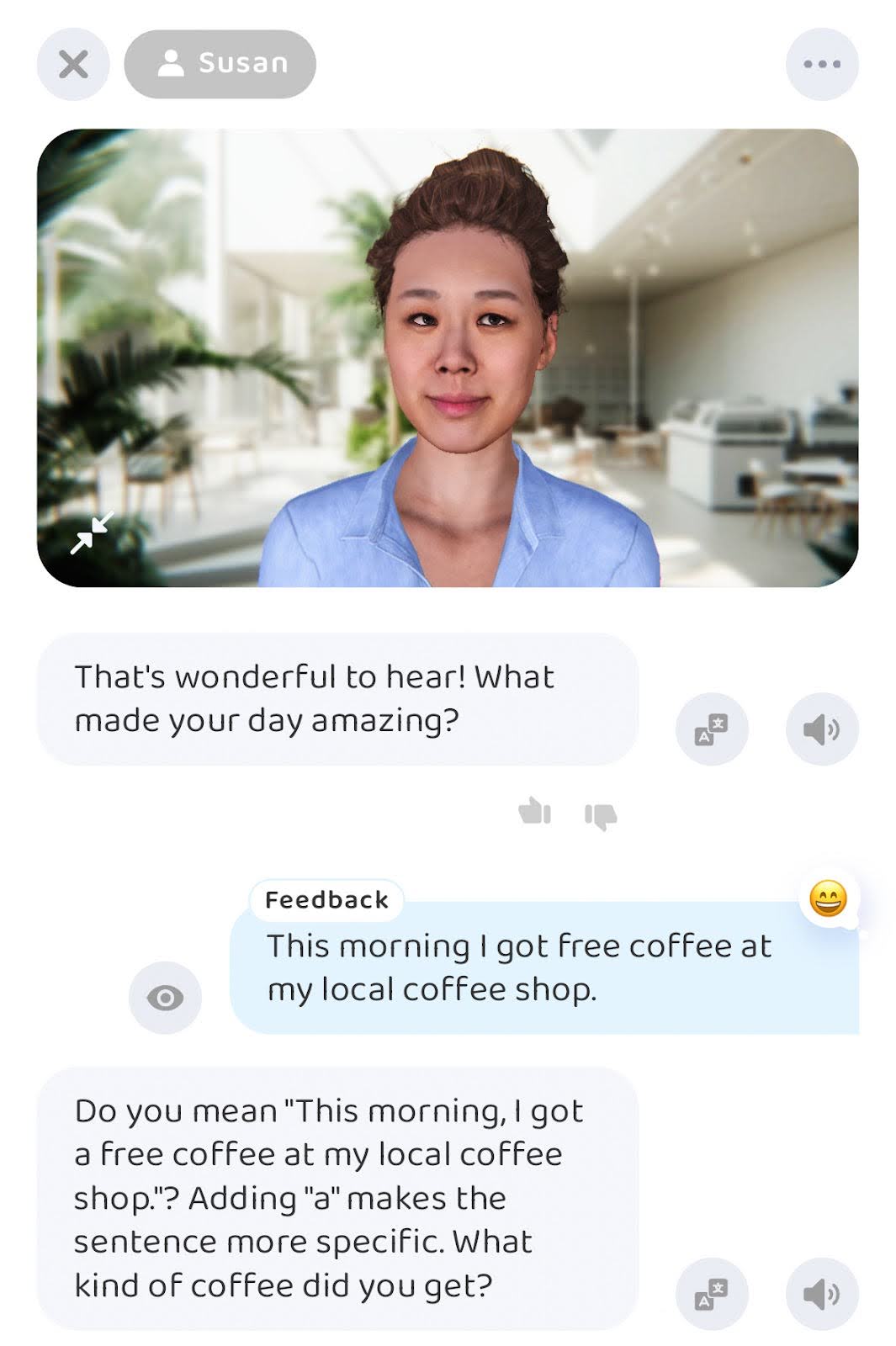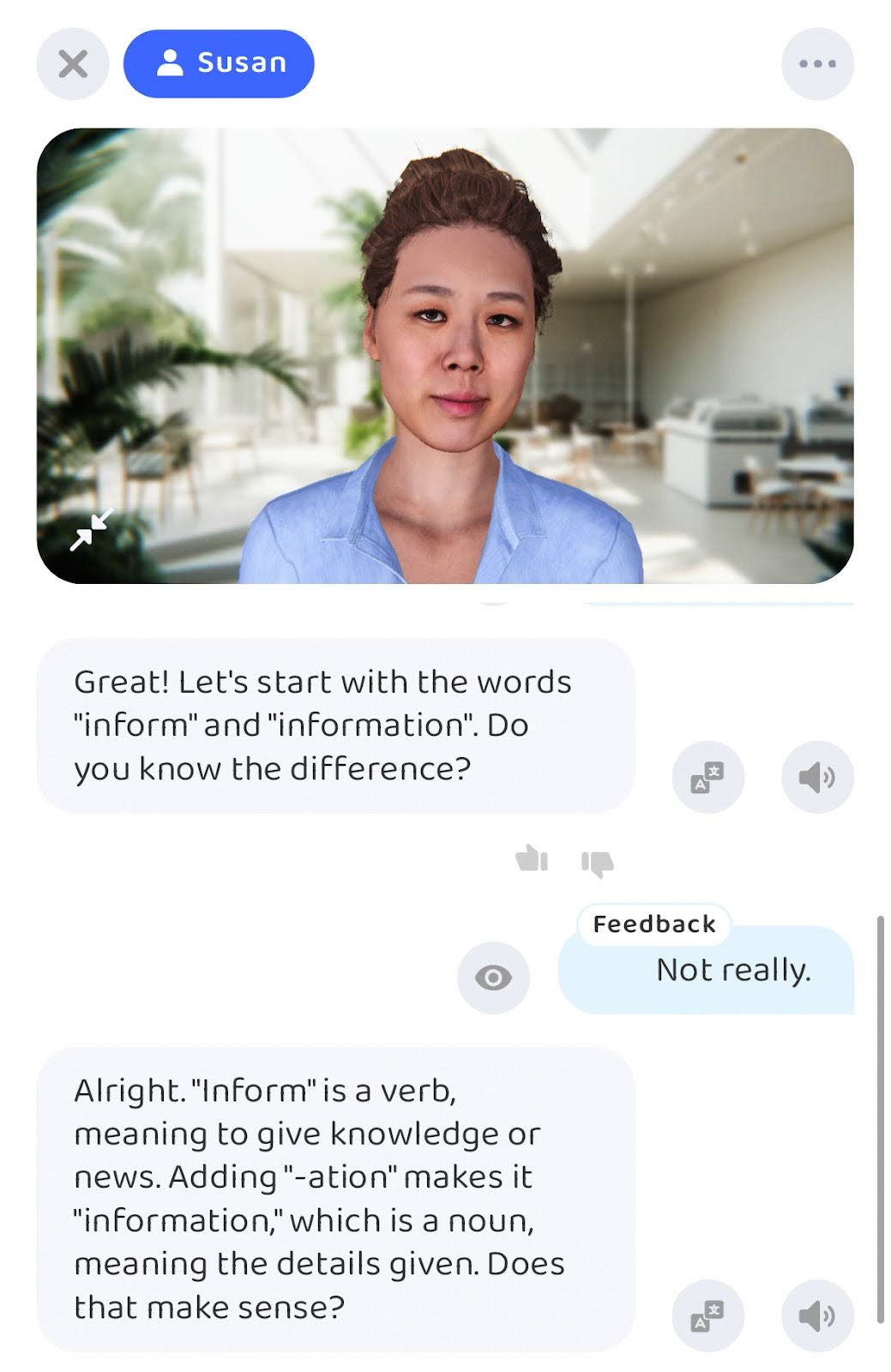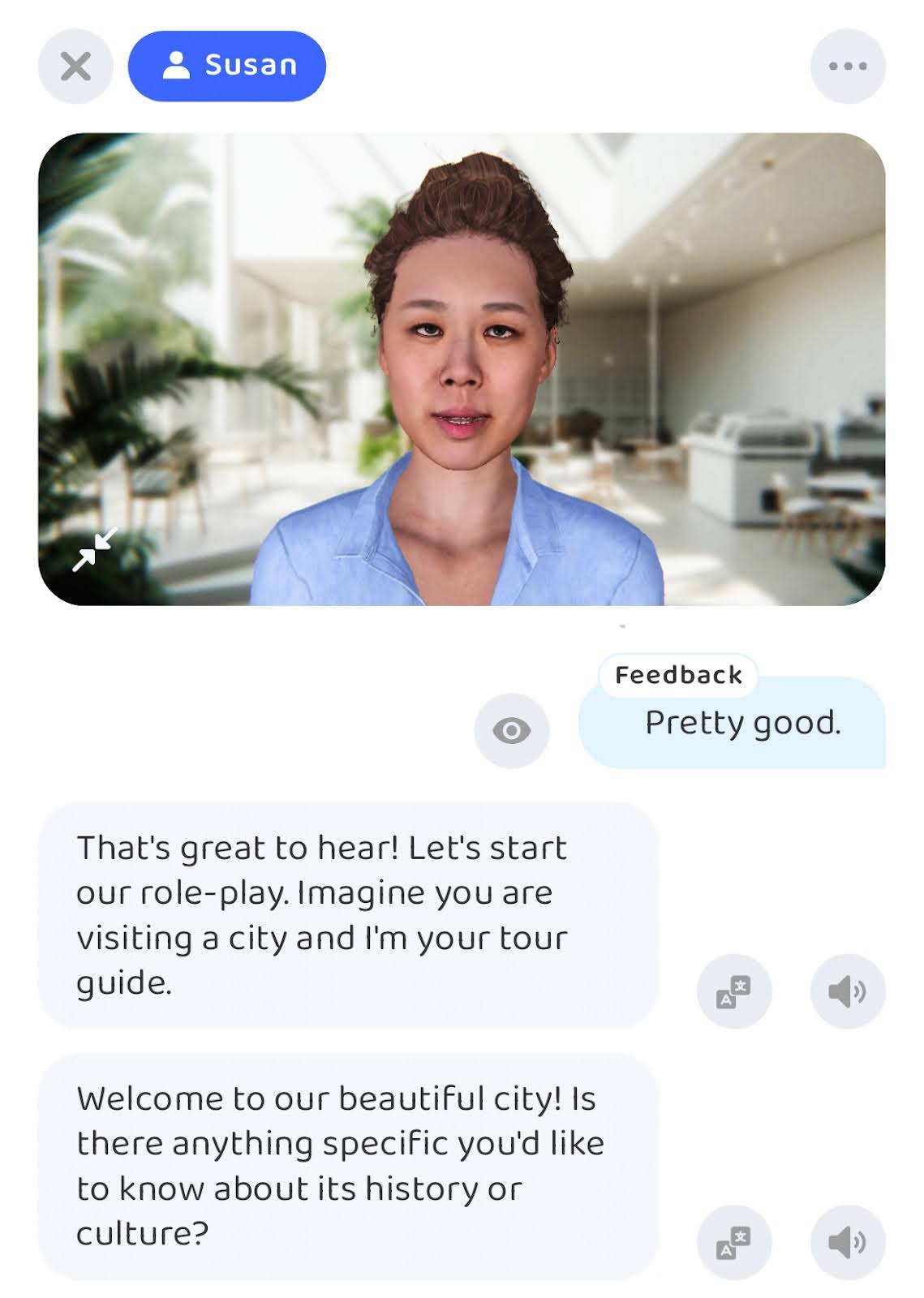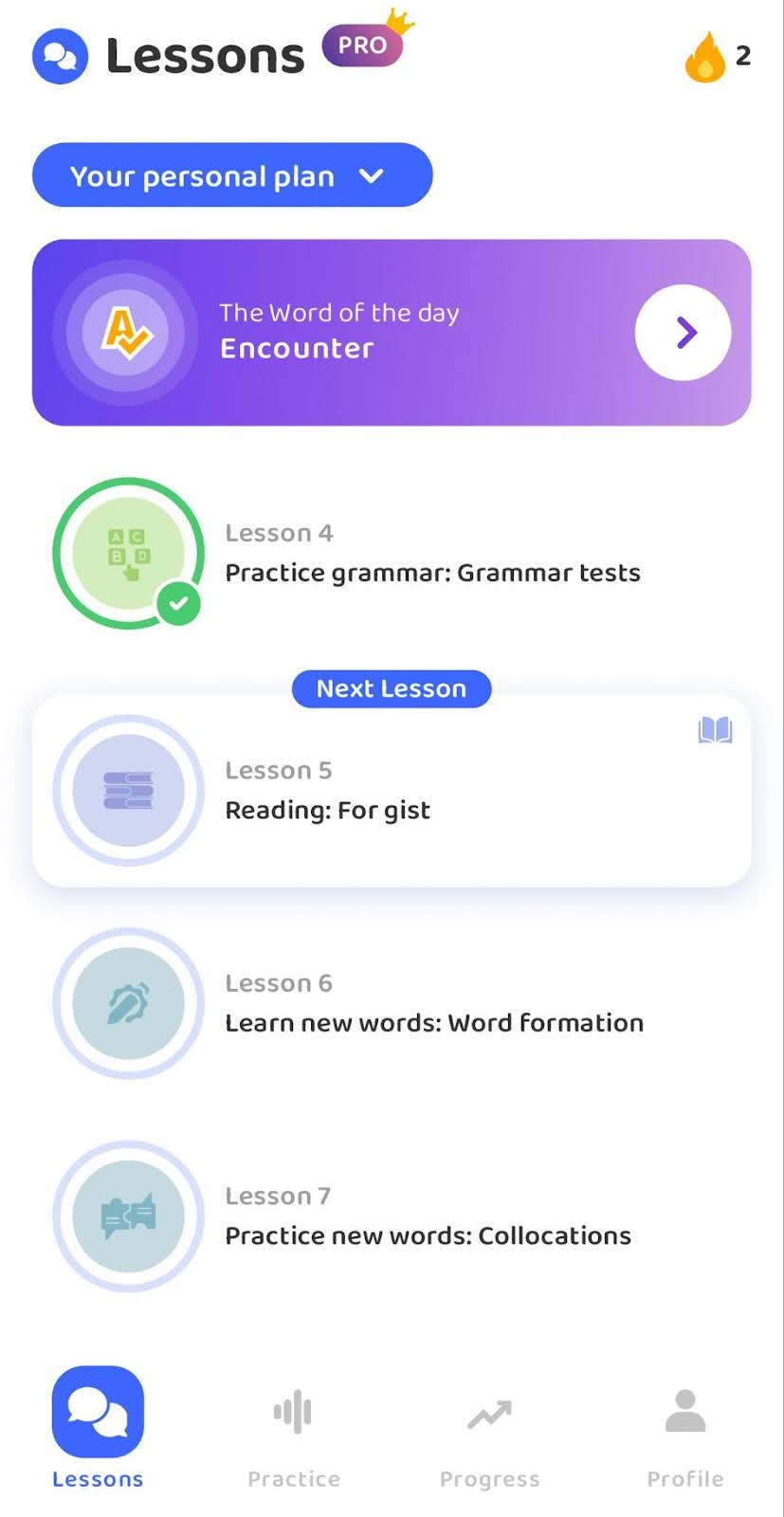Hi friends, I’m Susan—a globetrotting language tutor with Praktika! Today, we’re diving into some of the worst advice out there for learning English. Think filling in random blanks or memorizing isolated words is enough to get fluent? Not so much. Let me take you through ten of these popular myths, and I’ll show you what you should be doing instead.
Myth #1: Fill in Blanks Without Any Context 📝
Imagine you’re practicing English by filling in random blanks, like “The cat is ___ the box.” You might guess “in” or “under,” but do you really know why? Filling in blanks can feel productive, but without context, it’s just guessing—not real learning.
Why This Doesn’t Work: Language is about real communication. Completing worksheets doesn’t mean you’ll know how to use that phrase naturally in conversation. You need to understand when, why, and how to use words in real situations—not just on paper.
The Better Way: Context is King! With Praktika, you practice through real-life scenarios, like ordering at a restaurant or asking for directions. You won’t just learn words—you’ll learn how to use them naturally.
Quick Pro Tip: Focus on how words fit into a conversation. For example, instead of just memorizing “under,” imagine: “The cat is hiding under the table because it’s scared of the vacuum.” Context makes it stick!
Myth #2: Focus Only on Grammar Rules 📚
We’ve all heard it: “Master the grammar rules, and you’ll master the language.” It sounds logical, right? But the truth is, if you’re just memorizing endless grammar rules, you’re missing out on what actually makes English work—the conversation. Grammar is important, but it’s not the only piece of the puzzle. If you focus only on grammar, you’ll be left with a lot of theory and no real ability to put it into practice.
Why This Doesn’t Work: Knowing the rules doesn’t help if you can’t use them in real life. You might memorize every tense, but when it comes to actually speaking? You might freeze. Language isn’t just about rules—it’s about context and practice. Think about it: we don’t consciously remember grammar rules when speaking our native language. We just know it because we’ve practiced naturally.

The Better Way: Learn Grammar in Context Instead of memorizing rules, practice them in real-life scenarios. Praktika integrates grammar into natural conversations. Imagine chatting with me, Susan, about your favorite movie—I’ll help you learn the right tenses as we go.
Quick Pro Tip: The next time you come across a grammar point, try using it right away in a sentence related to your life. If you’re learning the past tense, think about what you did yesterday: “Yesterday, I watched a movie and ate popcorn.” Practicing in context helps cement those tricky rules in your mind.
Myth #3: Rely Only on Translation Apps 📱
Translation apps can be super handy—I’m not denying that. Need to know how to say “bathroom” in a foreign country? Sure, a quick translation will do the trick. But relying entirely on these apps to learn English? That’s a trap. You’re not really learning the language; you’re just finding quick answers.
Why This Doesn’t Work: Translation apps are like a crutch. You’ll get the answer, but you’re not going to retain it. Plus, translating every word in your head before you speak makes your conversations slow, awkward, and less natural. English, or any language, isn’t about direct one-to-one translations—it’s about thinking in that language, understanding context, and knowing the right phrases without needing a middleman app to do it for you.
The Better Way: Learn to Think in English Instead of always relying on translations, try to immerse yourself in English as much as possible. Praktika helps you do just that! By having conversations with me, Susan, or any of our AI avatars, you’ll start learning how to think in English. We encourage you to describe things in your own words, make mistakes, and learn as you go. This process helps you retain the language in a natural way.
Quick Pro Tip: Pick a simple object near you—like your phone or a glass of water—and try describing it in English without translating. It could be as basic as “This is my phone. I use it to talk to my friends.” The more you practice like this, the less you’ll need a translation app.
Myth #4: Memorize Long Lists of Vocabulary Words 📚
Picture this: you’re staring at a giant list of English words, trying to memorize each one like it’s a grocery list. Table, happiness, mountain, negotiate, optimistic. It might feel like you’re making progress, but the truth is, cramming vocabulary without any context is like trying to learn how to swim without water. You might know the words, but can you use them in a real conversation? Probably not.
Why This Doesn’t Work: Memorizing words in isolation doesn’t help you understand how they fit together in a sentence or how they’re used in different contexts. Plus, let’s be real—long lists are boring! Without context or examples, those words are likely to slip right out of your memory. English isn’t just about knowing words—it’s about using them naturally to express yourself.

The Better Way: Learn Through Real Conversations Instead of spending hours on word lists, try to learn vocabulary in context. With Praktika, I’m here to guide you through real conversations where you can learn words as they’re actually used. You want to learn about cooking, sports, or traveling? Let’s dive into those topics, and you’ll pick up words and phrases that are relevant—and way more likely to stick in your mind!
Quick Pro Tip:Next time you’re tempted to memorize a list, challenge yourself to use each word in a sentence instead. “I’m feeling optimistic about my trip up the mountain.” This makes learning active, not passive.
Myth #5: Only Listen to Perfect, Scripted Conversations 🎭
Let’s be real for a second—real conversations aren’t like scripted dialogues in a textbook or a formal podcast. They’re messy, spontaneous, and full of pauses, fillers like “uh” and “you know,” and sometimes, even mispronunciations. If all you do is listen to perfect, polished English, you’re going to be thrown off the first time you hear someone say, “Uh, yeah, I guess I’ll have the, um, latte?”
Why This Doesn’t Work: Perfect conversations are good for learning some vocabulary, but they don’t teach you how real people speak. Natural conversations are where you learn the rhythm, the slang, and the flow that makes your English sound authentic.

The Better Way: Dive into Real-Life Talk Praktika offers the chance to hear different accents, conversational quirks, and even casual chit-chat. Role-play a situation where someone might speak quickly, stumble over their words, or use everyday slang. This helps you prepare for what real English sounds like—not just the textbook version.
Quick Pro Tip: Next time you’re watching a TV show or movie, pay attention to the casual phrases people use—notice the “likes,” “uhs,” and how they start or end sentences. It’ll help you understand and feel more comfortable with the natural flow of conversation.
Myth #6: Only Practice with Formal Language 🤵
If all your English practice revolves around formal language, you might be in for a surprise when you step into casual, everyday conversations. Imagine learning how to say, “Good evening, how do you do?” and then walking into a coffee shop where everyone’s like, “Hey, what’s up?” It’s a bit of a culture shock, right? Formal English is important, sure—but it’s not what people use 90% of the time.
Why This Doesn’t Work: Formal language can help you write a great business email or make a good impression at a meeting. But if you want to blend in at a party or chat casually with your friends, you need to know the more relaxed, everyday phrases. Relying solely on formal language limits your ability to connect with others in real, human ways—and can leave you sounding a bit too stiff for casual settings.
The Better Way: Mix It Up! Praktika helps you practice a mix of both—formal for when you need to be professional and casual for everything else. You can role-play ordering a coffee, chatting with friends, or even giving a presentation. It’s all about balance, and that’s how you’ll become a well-rounded speaker.
Quick Pro Tip: Next time you learn a formal phrase, find out the casual version of it too. For example, instead of “How are you?” try “How’s it going?” This way, you’re prepared for any situation!
Myth #7: Focus Only on Your Strongest Skill 🏋️♂️
If you’re great at reading English, it can be tempting to just keep reading and avoid those challenging speaking or listening exercises. It feels good to stick to what you’re already good at, right? But that’s like only doing bicep curls at the gym and ignoring the rest of your body—you end up a bit lopsided in your abilities!
Why This Doesn’t Work: Language isn’t just about one skill. You need a blend of reading, writing, listening, and speaking to truly master English. If you only focus on what you’re comfortable with, the areas you struggle in will hold you back. Imagine being able to read an entire book in English, but freezing up when someone asks you about it. To become truly fluent, you’ve got to tackle all four skills.

The Better Way: Balance Is Key Praktika gives you lessons that are well-rounded and target all your skills. You can go from reading a short article to practicing speaking it aloud with me, and then test your listening comprehension. We make sure you’re improving across the board, not just where it’s easy.
Quick Pro Tip: Challenge yourself every week to work on your weakest skill. If speaking makes you nervous, try recording yourself saying a few sentences. If listening is tough, put on a podcast. Remember, growth happens when you step outside your comfort zone!
Myth #8: Stick to One Accent Only 🌍
Ever heard someone say, “You should only learn British English” or “Stick to American English, it’s easier”? That’s honestly some pretty limiting advice! English is a global language—spoken by millions in different countries, each with its own flavor, accent, and slang. If you’re focusing on just one accent, you’re missing out on a lot of what makes English so colorful and dynamic.
Why This Doesn’t Work: If you’re only comfortable with one accent, it can be really confusing when you encounter someone speaking with a different one. It’s like learning to swim but only in a shallow pool—I mean, what happens when you’re thrown into the ocean? English speakers are all around the world, and they come in many varieties. Being adaptable helps you understand different people and communicate more effectively wherever you go!
The Better Way: Embrace Variety! The best approach is to expose yourself to a range of accents, from Australian to South African to Canadian. In Praktika, we’ve got avatars with a mix of accents so you can get comfortable listening to English from all over. That way, no matter where you travel, you won’t be caught off guard by someone’s accent.
Quick Pro Tip: Challenge yourself to watch videos or listen to podcasts in different accents. Mix it up—maybe a cooking show in British English today and a sports recap in American English tomorrow. The more you hear, the more you’ll understand, and soon, you’ll be a pro at recognizing all kinds of English!
Let’s Toss the Bad Advice and Learn Effectively Instead!
Alright, we’ve covered a lot of “what not to do” when learning English—now it’s time to focus on what really works. With Praktika, you get personalized lessons, real-world context, and a supportive tutor who adapts to your needs. Ready to say goodbye to ineffective methods and hello to confident English skills? Let’s make it happen—together!

From Susan
Susan is your friendly AI English tutor from Praktika. With a background in consulting for international companies, she brings a wealth of cultural knowledge to her lessons. Whether you’re exploring English for travel, living abroad, or career growth, Susan’s expertise in multicultural business environments will help you master the language with confidence.
